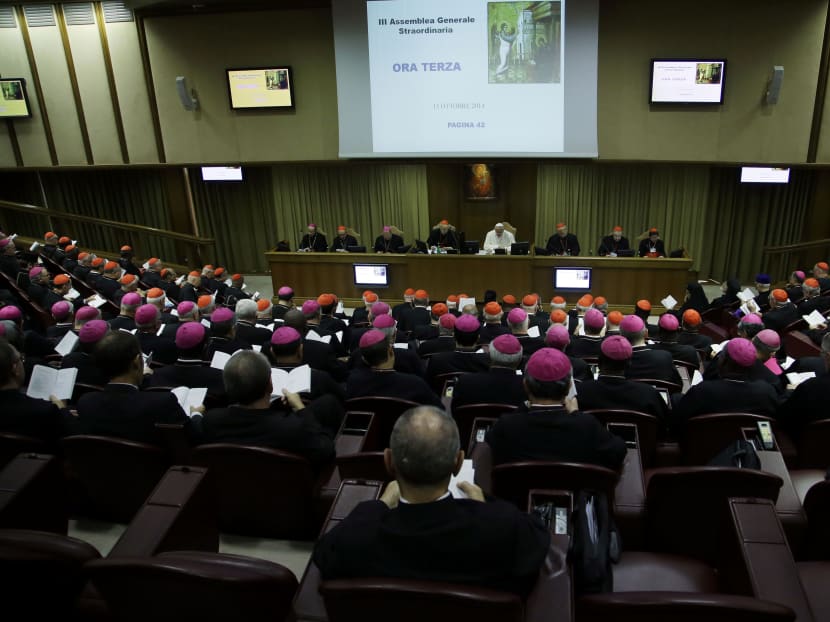Bishops seek to balance opening to gays: Rollback
VATICAN CITY — Conservative Catholic bishops concerned about an unprecedented opening to gays and divorced people are seeking to make their voices heard at a Vatican meeting on family life, emphasising the benefits of faithful Catholics, the fundamentals of church doctrine and the dangers of sin.

Bishops and Cardinals attend a morning session of a two-week synod on family issues at the Vatican, Oct 13, 2014. Photo: AP
VATICAN CITY — Conservative Catholic bishops concerned about an unprecedented opening to gays and divorced people are seeking to make their voices heard at a Vatican meeting on family life, emphasising the benefits of faithful Catholics, the fundamentals of church doctrine and the dangers of sin.
A document produced at the halfway point of the meeting was praised by gay rights groups as a seismic shift in tone toward acceptance of gays. Today’s (Oct 14) official summary of the closed-door discussions that followed the document’s release said that while the report was “appreciated”, some bishops offered additional reflections “to bring together various points of view” that should be reflected in a final version being released Saturday.
That was widely seen as an indication of the deep concern and dismay expressed by conservative bishops and Catholic commentators over yesterday’s document amid concerns that its almost-revolutionary welcoming tone might confuse Catholics about core church teaching.
The document said gays had gifts to offer the church and that their partnerships, while morally problematic, provided homosexual couples with “precious” support. It said the church must welcome divorcees and recognise the “positive” aspects of civil marriages and even Catholics who cohabit.
Several known conservatives who participated in the synod immediately came out against the report. The head of the Polish bishops’ conference, Cardinal Stanislaw Gadecki, called it “unacceptable” and a deviation from church teaching.
Hard-line American Cardinal Raymond Burke, the head of the Vatican’s supreme court, complained that the Vatican was releasing “manipulated” information about the goings-on of the synod that didn’t reflect the “consistent number of bishops” who opposed such a tone.
According to the Vatican summary of the debate, bishops suggested that the final version of the report highlight faithful, Catholic families to avoid “a near-exclusive focus on imperfect family situations”.
On gays, they said “prudence” was required “so that the impression of a positive evaluation of such a tendency on the part of the church is not created. The same care was advised with regard to cohabitation”.
The bishops noted that the word “sin” barely appeared in the document at all and that the final document must better explain the “law of gradualness” — a theological concept that encourages the faithful to take one step at a time in the search for holiness.
Bishops are concerned that an emphasis on graduality can lead to confusion about whether Catholics really must follow church law to the letter on hot-button issues like contraception.
Finally, the summary noted that some bishops firmly believe there is no room for change on the divisive issue of whether Catholics who divorce and remarry without getting an annulment can receive Communion.
Church teaching holds that without an annulment, these Catholics are living in sin and thus are ineligible to receive the sacraments.
Pope Francis has called for a more merciful approach and some favour a case-by-case approach, in which the couple undertakes a path of penance and could ultimately receive the sacraments. But conservatives have insisted there is no getting around Jesus’ words that marriage is indissoluble.
In the summary released today, the Vatican reported that “it was said that it is difficult to accept exceptions unless in reality they become a common rule”. AP






